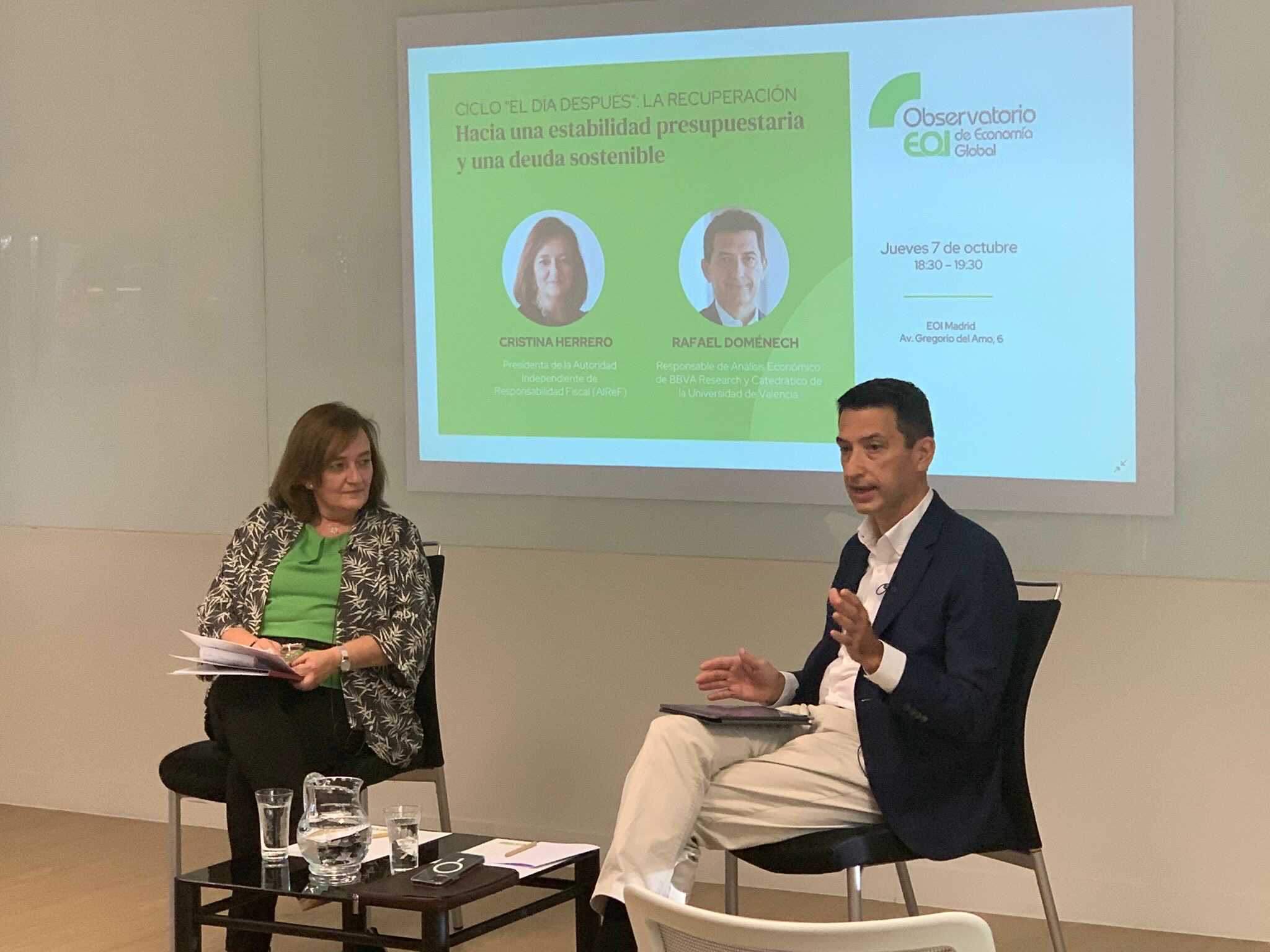- She argues that the scale of the fiscal challenge makes it necessary to begin a process of fiscal consolidation once the economic recovery gains traction and takes hold
- Cristina Herrero stresses the importance of a comprehensive strategy that will also address the quality of public finances and the necessary structural reforms
- She offers the potential of Independent Fiscal Institutions (IFIs), such as AIReF, to contribute to designing the strategy through independent and comprehensive sustainability analyses
The President of the Independent Authority for Fiscal Responsibility (AIReF), Cristina Herrero, took part today in the Session “The day after: The recovery. Towards budgetary stability and sustainable debt”, organised by the Director of the Observatory of the Escuela de Organización Industrial [School of Industrial Organisation – EOI], Agustín del Valle, and the head of Economic Analysis at BBVA Research, Rafael Doménech. At the event, held at the EOI Madrid Campus, Cristina Herrero stated that the economic recovery makes it necessary to design the return to budgetary stability.
The President of AIReF explained that, although uncertainty remains, it is necessary to design a fiscal strategy for a return to budgetary stability. Although monetary and financial conditions are comfortable at the moment, Spain will emerge from the crisis with more vulnerable public finances in terms of debt. She indicated that a greater frequency of extreme shocks, profound changes in the behaviour of economies and the tendency of the Spanish economy to consolidate debt increases, make it advisable to think about generating fiscal margins.
Cristina Herrero stated that when the economic recovery gains traction and takes hold, it will be time to begin a process of fiscal consolidation through a comprehensive strategy that not only acts directly on public finances, but also on economic growth in order to make the fiscal consolidation process itself sustainable.
She clarified that the medium-term vision recommended by AIReF is not fiscal consolidation as a synonym of cuts. It is a comprehensive strategy that focuses on the quality of public finances – an area in which the efficiency of revenue, expenditure and policies plays an important role – and on addressing major structural reforms (pensions, regional financing system, tax system, labour system, etc.).
Cristina Herrero highlighted that EU funds are an opportunity to promote more robust and sustained growth over time, but at the same time, they pose major challenges.
Firstly, there is uncertainty about the macroeconomic impact. This is partly due to the lack of evidence about this type of investment and, especially, due to doubts regarding the pace of execution of the projects. Secondly, the President explained, it is a very demanding challenge in terms of management, as it involves a large number of reforms in a short period of time, and many of them in critical or sensitive areas – such as employment, taxation and pensions – where reaching a consensus is not easy. Faced with these challenges, Cristina Herrero highlighted the evaluation activity as a key element in supporting the effectiveness of the funds. It will require an effort from all tiers of government and the different evaluation bodies.
The key role of IFIs
Cristina Herrero explained that IFIs can provide very useful inputs in the design of a medium-term strategy. They are able to analyse factors affecting the sustainability of public accounts, provide a diagnosis of the position and outlook of public finances, and study the implications of alternative budget paths.
Furthermore, the President added, the knowledge of specific national features and the independence of IFIs mean that they can play an important role in a new European fiscal framework, which is once again under discussion. There is a certain consensus for change that effectively goes in the direction of strengthening their role in a context of somewhat decentralised fiscal oversight. In addition to complying with the legality of its functions, the institution is doing a great job of providing information at a time of proliferation of new measures at a very fast rate.
She also highlighted the importance of the activity of Independent Fiscal Institutions (IFIs), such as AIReF, in the current context of suspended fiscal rules. She clarified that the suspension of rules does not imply a suspension of the supervisory role of the institution, since it ensures compliance with the national and European fiscal guidelines that have replaced the rules. In addition, at a time of uncertainty and proliferation of measures, efforts have been made to provide detailed and substantive information on their economic and budgetary impact.







